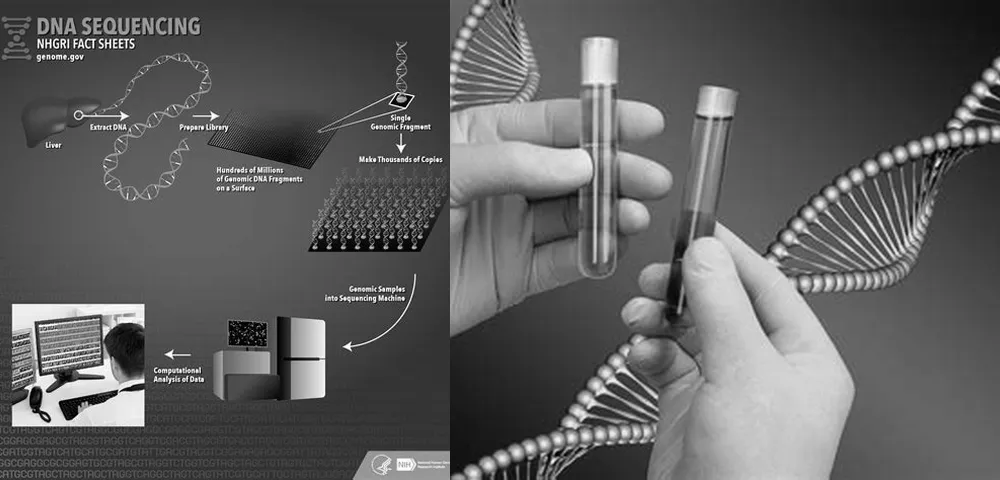DNA Technology: Which Fields Benefit from Its Revolutionary Impact? – In a world where technology constantly evolves, DNA technology emerges as a game-changer in various fields. From medicine and agriculture to forensic science and biotechnology, the impact of DNA technology is undeniable. Curious to know how this remarkable innovation revolutionizes our lives? Look no further! In this blog post, we will explore the diverse fields where DNA technology proves useful, uncovering its potential to transform the way we live, work, and thrive. So, buckle up and get ready to embark on an exciting journey through the wonders of DNA technology!
Revolutionizing Medicine and Research with DNA Technology
The advent of DNA technology has been a game-changer in the field of medicine and research. By allowing scientists to study and manipulate DNA, new vistas have opened up in the creation of medical treatments and the understanding of complex diseases.
Genetic Engineering in Disease Prevention
Genetic engineering, a direct offshoot of DNA technology, is particularly impactful in preventing diseases. Through gene therapy, defective genes can be replaced with functional ones, potentially curing genetic disorders at their source. This approach is being researched for conditions like cystic fibrosis, hemophilia, and sickle cell anemia.
Advancements in Pharmacology
In pharmacology, DNA technology has paved the way for personalized medicine. By understanding a patient’s genetic makeup, doctors can prescribe medication that is more effective and has fewer side effects. This customization of treatment plans is leading towards more successful outcomes in patient care.
Genetic Testing and Disease Detection
DNA technology is essential in genetic testing, which is pivotal in early detection of hereditary diseases. By identifying the presence of certain genetic markers, healthcare providers can predict the likelihood of a patient developing specific conditions, allowing for early intervention and management.
Enhancing Agricultural Growth Through DNA Technology
Agriculture has been significantly transformed by DNA technology, leading to increased crop yields and better food security globally.
Recombinant DNA Technology in Agriculture
Recombinant DNA technology involves the insertion of beneficial bacterial genes into plant cells. This has led to improved plant growth by increasing nitrogen fixation efficiencies – a process critical for plant nutrition.
Genetically Modified Organisms (GMOs)
Through genetic modification, crops can be made resistant to pests and diseases, reducing the need for chemical pesticides. GMOs can also be engineered to withstand harsh environmental conditions, ensuring food production even in challenging climates.
Forensic Science and DNA Technology
DNA technology has revolutionized the field of forensic science, providing irrefutable evidence that can link suspects to crime scenes or exonerate the innocent.
Genetic Tests in Forensic Analysis
Forensic analysts use DNA profiling to match biological samples found at crime scenes with suspects. This technique is so precise that it can differentiate between individuals, except for identical twins, making it an invaluable tool in criminal investigations.
Archaeological Insights Through DNA Analysis
Apart from crime detection, DNA technology has become an indispensable tool in archaeology. By analyzing ancient DNA, scientists can uncover relationships between populations, track migrations, and gain insights into the lives of people from bygone eras.
Biotechnology: A Field Built on DNA Technology
Biotechnology encompasses a broad range of applications where DNA technology is the cornerstone. From producing human insulin to developing biofuels, biotechnology relies heavily on the manipulation of DNA.
Genomics and Proteomics
Two biological fields that extensively utilize DNA technology are genomics and proteomics. Genomics involves the study of an organism’s complete set of DNA, while proteomics focuses on its entire set of proteins. These disciplines have provided deeper insights into the genetic basis of life and disease.
Food Industry Innovations
In the food industry, DNA technology is used to develop products with enhanced nutritional profiles, longer shelf life, and improved taste. It also plays a role in ensuring food safety by detecting genetically modified ingredients and pathogens.
The Societal Impact of DNA Technology
The influence of DNA technology extends beyond the laboratory and into the fabric of society.
Ethical Considerations
As DNA technology continues to evolve, it brings with it ethical questions about privacy, consent, and the potential for genetic discrimination. It’s crucial to address these concerns through legislation and informed public discourse.
Economic Growth and Job Creation
The biotechnology sector, fueled by advances in DNA technology, contributes significantly to economic growth. It creates jobs, fosters innovation, and stimulates investment in research and development.
Conclusion
DNA technology’s influence on various fields is profound and far-reaching. It is not just a tool for scientists but a foundational element that will continue to shape the future of medicine, agriculture, forensics, and biotechnology. As we harness its potential, we must also navigate the ethical landscape it presents, ensuring that these advancements benefit humanity as a whole.
FAQ & Common Questions about DNA Technology
Q: What fields is DNA technology useful in?
A: DNA technology is useful in fields such as pharmacology, genetic engineering in disease prevention, increasing agricultural growth, and detection of disease and crime (forensics).
Q: What can DNA technology be used for?
A: DNA technology allows scientists to study DNA, which contains the instructions for all aspects of our cells’ structure and function. It also enables scientists to detect and assess foodborne pathogens, diagnose crop and livestock diseases, improve breeding practices, and even authenticate meat products, plant material, documents, and labels.
Q: How is DNA technology used in agriculture?
A: In agriculture, DNA technology has improved plant growth by increasing nitrogen fixation efficiencies and cloning bacterial genes, which are then inserted into plant cells.
Q: How does DNA technology benefit society?
A: DNA technology can be used to identify criminals with incredible accuracy when biological evidence exists. It can also be used to clear suspects and exonerate individuals who have been mistakenly accused or convicted of crimes.

